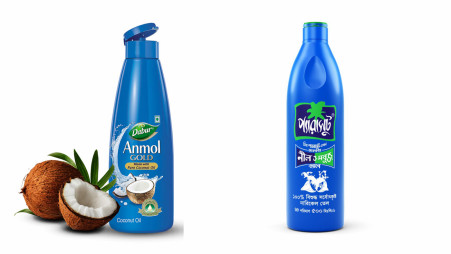From hair oil to toothpaste: The subtle intricacies of trademark infringement
What amounts to trademark infringement and what does not? According to the courts, it is not just about whether one company creates identical or confusingly similar marks. A number of other considerations come into play

Section 2(8) of the Trademarks Act 2009 defines a trademark as the marks which can be connected to goods or services of a certain proprietor. Trademarks create the perception in the consumer's mind that a product actually belongs to a certain entity/business or a brand via the mark. According to this definition, this can be considered intellectual property. Till now, the Trademarks Act 2009 is the only law which protects trademarks in Bangladesh.
If a business uses a trademark that is identical or confusingly similar to an already existing one without taking permission from the owner, it can be considered an infringement. This act of infringement can bring consequences such as loss of the goodwill of a person or their business, along with financial and reputational damage.
Elements of deceiving the public are also included in the discussion. Section 96(d) of The Trademarks Act 2009 of Bangladesh terms this affair as 'passing off'. This gives a party the right to bring action against such infringement. Hence, a business looking to design or market its product must make sure that they do not infringe upon other businesses.
Now, a general question arises when we continue our discussion on trademarks and infringement – which acts could amount to creating confusion with others' trademarks? Section 26 of the act gives out various grounds as to what constitutes infringements relating to a trademark. An example would be copying a trademark identically. Our focus here, however, is to elaborate on the act of 'passing off' which is a different overlooked topic.
A few cases are discussed here to shed light on this. General provisions relating to similarity and confusion in using marks against well-known or registered trademarks are alluded to in the act itself. Using a "confusingly similar" mark like existing trademarks relating to goods or services is a ground for infringement. Purposefully confusing the public regarding the products can also be considered infringement according to these provisions.
We can take the case of Asian Consumer Care (Pvt.) Limited vs Marico Limited (2021) as a case in point. Marico claimed that the shape of the bottle, colour and design, including the splash of the broken coconut used by Asian Consumer Care's marketed product Dabur oil bottles are confusingly similar to the design, layout, colour and bottle of Parachute coconut oil marketed by Marico Limited.
Asian Consumer tried to argue that according to Sections 2(23) and 2(8) of the Trademarks Act 2009, a bottle or a bottle's specific colour cannot be considered a trademark, therefore, any other organisation may promote or sell the same product using a bottle of a similar colour.
But later on, this argument did not hold water in the higher court of Bangladesh.
Another relevant case would be Jamal Uddin Ahmed vs. Abdul Haque (2003). It was followed by the court for the risk of confusion test. The test entails that if the public is at risk of becoming confused, then there is no need for genuine deception or confusion. The risk itself is enough to be considered infringing. Hence businesses must be careful in discerning if their product has the potential to create confusion among the public by looking similar to some other product.
On the other hand, the case of Colgate Palmolive Co. Limited vs. Patel decreed that the red and white colour combination had become common to toothpaste trade in domestic and international markets. For that particular reason, it cannot be trademarked. So an observation was made that anybody may use a certain colour while promoting a specific type of good when it has developed a distinct identity in relation to that type of good or product.
In the case of Christian Louboutin Sas vs. Abubaker & Ors in India, a similar situation played out. In that particular instance, the Delhi High Court specifically concluded that red had evolved into a specific shade that was frequently used for women's shoes. That means businesses are free to use common elements regarding a product.
But the Court may depart from these views when such frequently used elements of a product's outer look are used deceptively, particularly the combinations used in the case of Asian Consumer Care (Pvt.) Limited vs Marico Limited (2021) discussed earlier. The blue, white and green colours were used by Asian Consumers in a very confusing way in their hair oil product's bottle design. So the court concluded that those colour combinations, designs and layouts had every likelihood to have caused confusion among unwary people of Bangladesh, taking into account that most of the customers of this type of coconut hair oil are very ordinary people who will not meticulously compare the products.
This leads to an interesting point of the social obligation of the businesses, as deliberated on by the court. They have to factor in that the people they are catering to do not fall into the trap of deception because of the way they market their products. In this age of hyper-industrialisation, as market competition is increasing on the same product by different entities who are in the same business, trademarks are the elements which can ensure the goodwill of a business.
Israt Jalil Mim and Maruf Hasan Tamal are members of the Research Wing at A.S. & Associates.
Disclaimer: The views and opinions expressed in this article are those of the author and do not necessarily reflect the opinions and views of The Business Standard.



 Keep updated, follow The Business Standard's Google news channel
Keep updated, follow The Business Standard's Google news channel
















